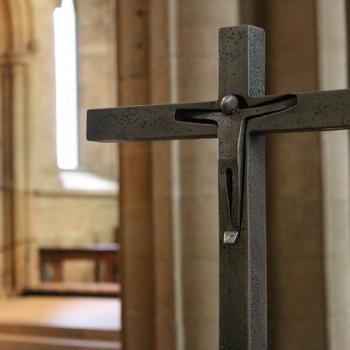 .
.
(image via Pixabay)
This is a guest post by John Cavanaugh-O’Keefe. John is a father of six, a longtime pro-life activist in the fields of nonviolence and eugenics, and the author of 21 Stranger Claims in the Old Testament. He blogs at Sign of the Crossing.
I visited a local mosque last night, for evening prayer. I went there to invite my neighbors to dinner, to dispel some of the fear that is sweeping the nation. A few details:
I knelt in prayer with my brothers. They were facing toward Mecca. But they were bowing to God, not to a city or a stone. I knelt with them, not caring at all which way I faced, so I faced the same way they faced.
I was clumsy, with a tight ankle. And I was the only Caucasian there. And most (all?) of them knew each other. So I stuck out. But they went out of their way to be welcoming without being pushy. What’s the difference between treating someone as a stranger and treating someone as a guest?
I listened during the prayers, and understood little. I do recognize the words for grace and mercy, and heard them say over and over, “God is gracious and merciful.” If you only understand a little, that’s a good place to get stuck. Every chapter but one in the Quran begins with that: Ar-Rahman, Ar-Rahim – God is gracious and merciful.
One man shook my hand 20-30 times. He didn’t know how to explain what he had to say in words, so he took my hand. I got it. And I didn’t want to let go either. I had imitated him during prayer, half-bowing when he half-bowed, kneeling when he did. So he knew I was a stranger there, and also knew I was stiff. And also knew that I reverence God. And also knew that I was respectful of him and his ways. He knew a lot, without words. His hands were not solid and rough like bricks; he isn’t a manual laborer. But his hands were strong, and his face was craggy and perhaps Lincolnesque. I did not want to let go either.
One man told me that the Quran says Mary sometimes prayed lying flat on her face. Did the Bible say the same? (They knew I was a Christian, and respected that.) No, I don’t think that’s in the Bible. But if she ever lay on her face, ever for any reason, then I would say that she prayed prostrate, because she was always praying. I don’t think the man was asking me about the Bible. I think he meant to say that he loves Mary, and thinks about her. And – not in words – he wanted to know if that was a bond between us. Yes, I too think about Mary and love her, and yes, it is a bond between us.
The imam sat with me to talk for a few minutes: introductions, my invitation. But there was another man there the imam did not know, and he welcomed that man too. The man said that his friend was over there in the corner with half a dozen other men, praying. His uncle just died. The imam politely disengaged from his conversation with me and went to help the bereaved. That was 100% familiar, although I know very few words in Arabic. I was deeply moved by the prompt and tender service that the imam offered. Of course, that’s his job; he just did what was expected of him. His job, no more. His job: to offer support and help and comfort in the face of life’s worst moments.
When I was leaving, I passed small knots of men in the half-light. They smiled and nodded. As I approached my car, I thought I heard someone calling my name softly but clearly, “John! John! John!” It was a very sweet moment, although I don’t often think about how important names are. So I went back, and one man – easy to understand, with no accent – wanted more details about the dinner invitation. They will bring a contingent, for sure, although he could not give me a number.
My friend and classmate Phil Lawler says (if I understood him correctly) that interfaith dialogue must be based on reason. He says that Benedict’s speech at Regensburg says so. (Perhaps I misunderstood.) I didn’t read Regensburg quite the same way. I thought the Pope’s point was negative and then suggestive: (1) negative, asserting that blind faith and assertions of unshared and inflexible dogma do NOT help dialogue; but (2) suggestive, rational dialogue works, and can carry us very far forward. Phil got me thinking about many other ways of moving a dialogue forward: reason and reasoned argument for sure, but also shared bread and simple touch and music and bowing and raising children and protecting the weak and loving poets including Mary and respecting the old and admiring trees and soccer and laughter and patience and courage and stories and stories and stories.
I was very happy to visit the mosque. I don’t think my visit will produce peace on earth. But I was very happy. I am not a very good person, and so I don’t think that my simple happiness there is a reliable Ignatian test of anything. But I was, and I remain, deeply happy.
We will share bread, and I’ll shake my friend’s hand again. And, God willing, I will remember his name.













